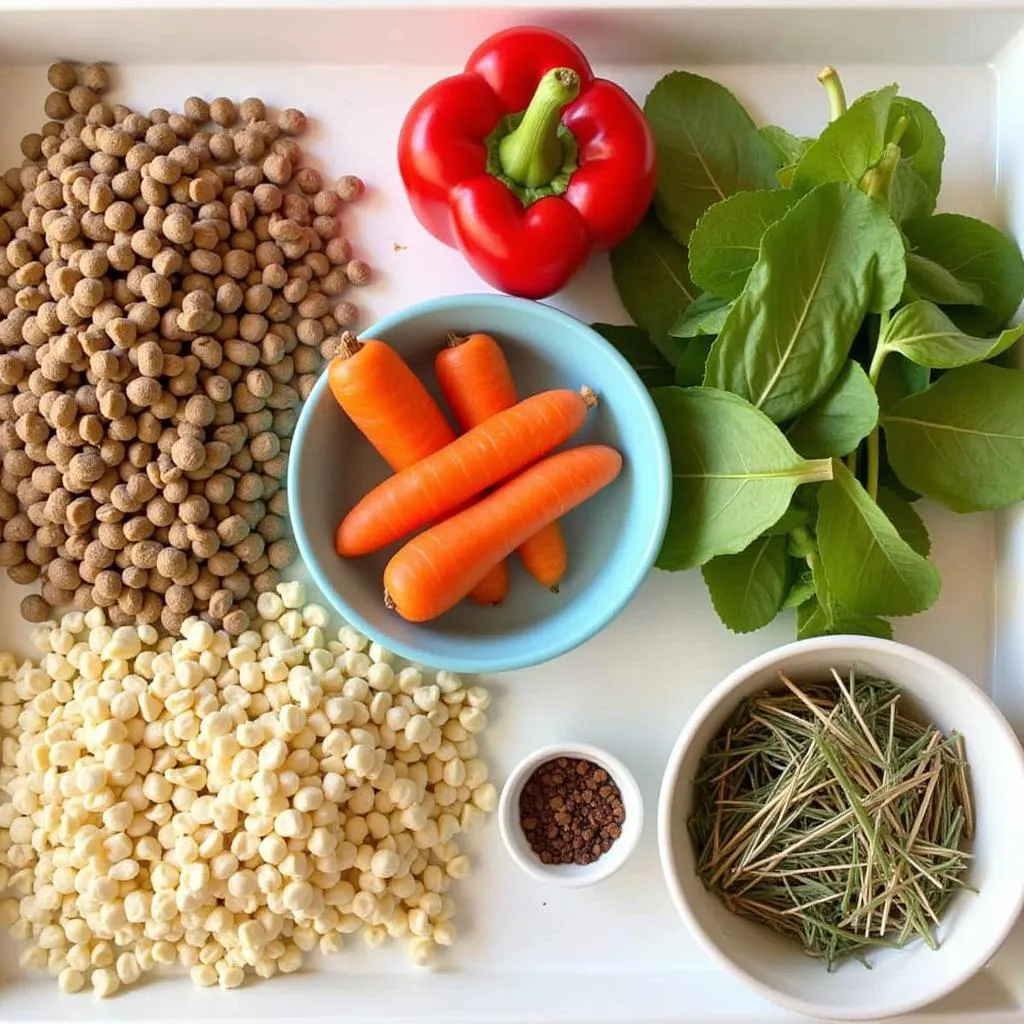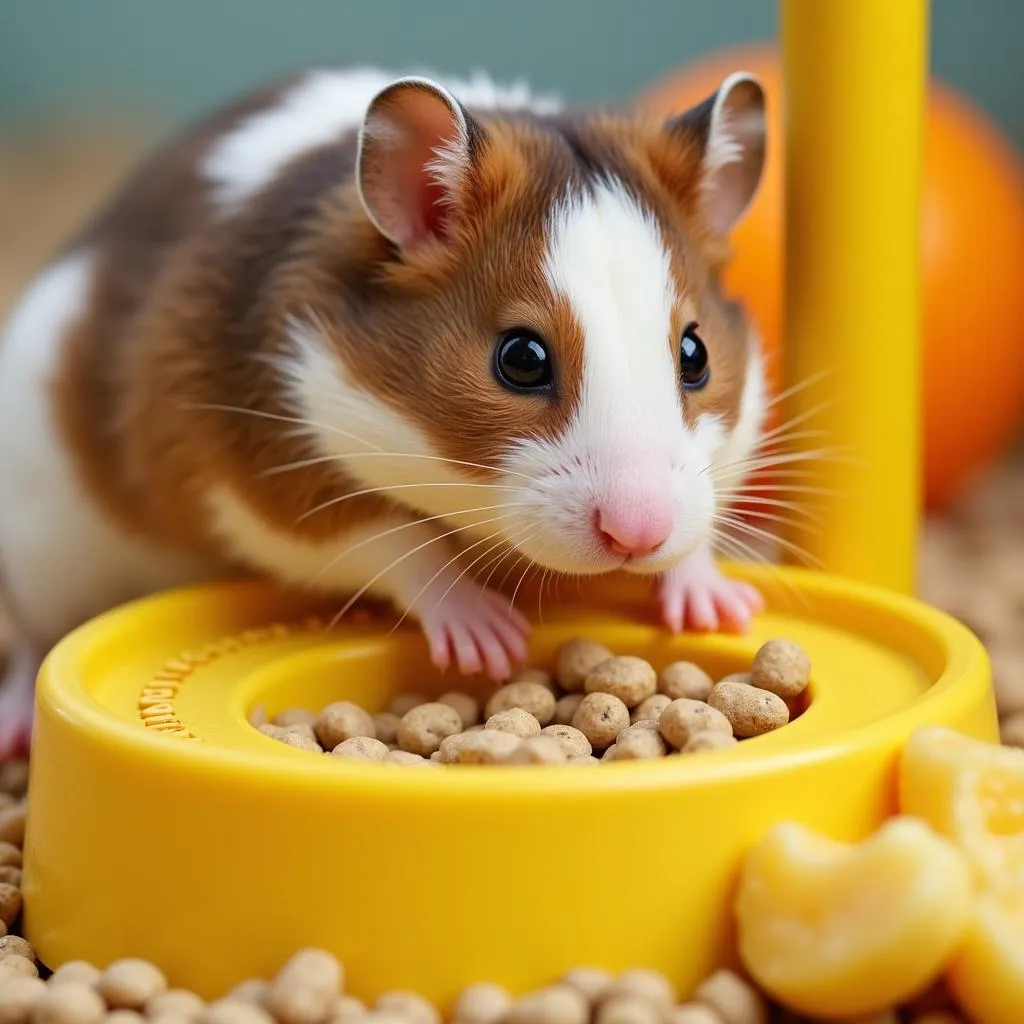Rodent Food is more than just pellets and seeds. Providing a balanced and nutritious diet is crucial for the health and happiness of these small but amazing creatures. Whether you’re a seasoned rodent parent or a newbie considering welcoming one of these adorable animals into your home, understanding the intricacies of rodent food is essential.
Deciphering the Diet: What Do Rodents Eat?
Rodents are surprisingly diverse in their dietary needs. While the image of a mouse nibbling on cheese might be popular, the truth is far more nuanced. Different types of rodents thrive on various combinations of:
-
Commercial Rodent Food: This forms the foundation of your pet’s diet and typically consists of pellets or blocks specifically formulated for different species like rats, mice, hamsters, gerbils, and guinea pigs.
-
Fresh Fruits and Vegetables: These offer essential vitamins, minerals, and hydration. Leafy greens like spinach and kale, crunchy carrots and bell peppers, and juicy fruits like apples (without seeds!) and berries are all great options.
-
Hay: For some rodents, especially guinea pigs and chinchillas, hay is a cornerstone of their diet, aiding in digestion and dental health.
-
Treats: Occasional treats can add variety and enrichment. Unsalted nuts, plain yogurt drops, and small pieces of cooked egg can be enjoyed in moderation.
 Variety of Rodent Food Options
Variety of Rodent Food Options
Choosing the Right Food: Not All Rodent Food Is Created Equal
Navigating the world of rodent food can feel overwhelming with the countless options available. Here’s what to keep in mind:
-
Species-Specific Formulas: Different rodents have unique nutritional requirements. Ensure you’re selecting a commercial food specifically designed for your pet’s species.
-
Ingredient Quality: Opt for foods with high-quality ingredients, such as whole grains, vegetables, and protein sources. Avoid those with artificial colors, flavors, and preservatives.
-
Freshness: Check expiration dates and ensure the food smells fresh. Rodents are sensitive to spoiled food and it can make them ill.
-
Your Rodent’s Age and Health: Consider your pet’s specific needs. Young, growing rodents, pregnant or nursing mothers, and senior rodents may benefit from specialized diets.
Beyond the Basics: Enrichment and Healthy Habits
Feeding your rodent goes beyond simply providing food. Here are some tips for creating a positive and enriching feeding experience:
-
Scatter Feeding: Instead of placing food directly in a bowl, scatter it around their enclosure to encourage natural foraging behaviors.
-
Puzzle Feeders: These interactive feeders provide mental stimulation and can help prevent boredom.
-
Fresh Water Daily: Ensure your rodent has access to fresh, clean water at all times. Use a water bottle or a heavy, tip-proof dish.
-
Monitor Intake and Weight: Keep an eye on your rodent’s food intake and weight. Sudden changes could indicate health problems.
 Rodent Using a Puzzle Feeder
Rodent Using a Puzzle Feeder
A Word from Dr. Emily Carter, Veterinarian:
“Providing a balanced diet is one of the most important things you can do for your rodent’s well-being. Just like us, they need a variety of nutrients to thrive. Don’t hesitate to ask your veterinarian for personalized dietary recommendations for your furry friend.”
Rodent Food FAQs
Q: How often should I feed my rodent?
A: Most rodents do well with having food available at all times, as they are nibblers. However, fresh fruits and vegetables should be provided daily and removed if not eaten within 24 hours to prevent spoiling.
Q: Can I give my rodent treats?
A: Yes, but in moderation! Treats should make up no more than 10% of their diet. Stick to healthy options and avoid sugary or processed foods.
Q: What are the signs of an unhealthy diet in my rodent?
A: Signs of dietary problems can include weight loss, diarrhea, hair loss, lethargy, and changes in eating habits. If you notice any of these, consult your veterinarian.
Conclusion
Choosing the right rodent food is a fundamental aspect of responsible pet ownership. By understanding your rodent’s dietary needs and providing a varied and balanced diet, you can help them live long, healthy, and happy lives. Remember, a well-fed rodent is a happy rodent!
For any questions or assistance in selecting the perfect rodent food, our dedicated team is here to help. Contact us at Phone Number: 02437655121, Email: minacones@gmail.com or visit our location at 3PGH+8R9, ĐT70A, thôn Trung, Bắc Từ Liêm, Hà Nội, Việt Nam. We have a 24/7 customer support team.